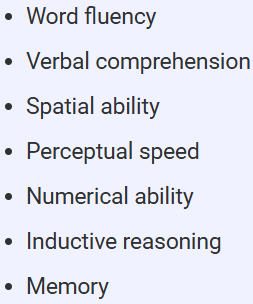Intelligence and Cognitive Abilities
1/17
Earn XP
Description and Tags
These flashcards cover key concepts and definitions related to intelligence, cognitive abilities, and theories surrounding the assessment of intelligence.
Name | Mastery | Learn | Test | Matching | Spaced |
|---|
No study sessions yet.
18 Terms
Intelligence
Multifaceted capacity that manifests in different ways, including the abilities to acquire knowledge, logical reasoning, planning, and problem-solving.
General Mental Ability
The total product of the various separate and distinct elements of intelligence.
Interactionism
The concept that heredity and environment interact and influence the development of intelligence.
Two-Factor Theory of Intelligence
The theory that intelligence has two components: general intelligence (g) and specific intelligence (s).
G Factor
The general ability component of intelligence, as defined in the Two-Factor Theory.
S Factor
The specific ability component of intelligence, as defined in the Two-Factor Theory.

Primary Mental Abilities
A theory by Thurstone which suggests that intelligence is composed of seven distinct abilities.
Multiple Intelligences
A theory developed by Gardner suggesting there are various forms of intelligence, such as logical-mathematical, linguistic, and interpersonal.
Crystallized Intelligence
Skills and knowledge acquired that depend on exposure to culture and education.
Fluid Intelligence
Nonverbal and culture-free abilities that are independent of specific instruction.
PASS Model
A model of intelligence that refers to Planning, Attention, Simultaneous, and Successive processing.
Deviation IQ
A measure that reflects an individual's performance compared to others of the same age.
Culture-Free Intelligence Test
A test designed to control for cultural factors, focusing on nonverbal and performance items.
Flynn Effect
The observed rise in IQ scores over time, suggesting an improvement in cognitive abilities across populations.
Convergent Thinking
A deductive reasoning process involving the recall and consideration of facts to arrive at one solution.
Divergent Thinking
A creative thinking process that generates multiple possible solutions to a problem.
Vulnerable Abilities
Abilities that decline with age and may not return to pre-injury levels after brain damage.
Maintained Abilities
Abilities that tend to remain stable or return to pre-injury levels after brain damage.